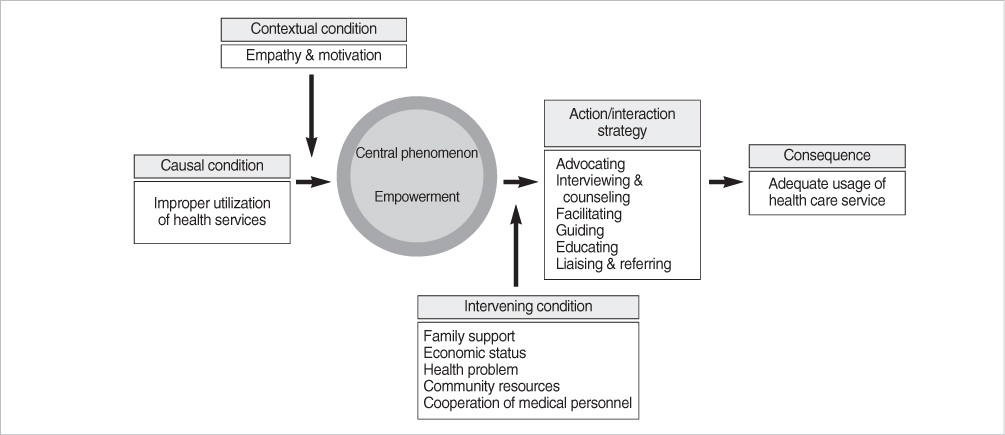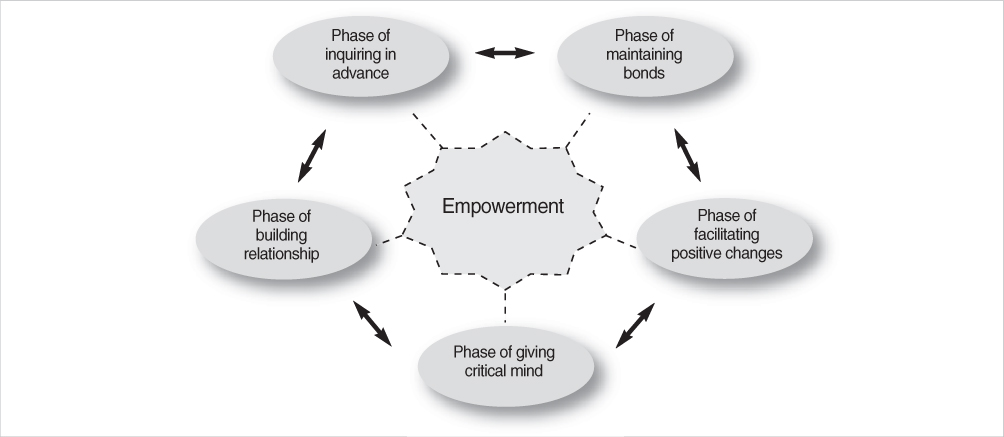Articles
- Page Path
- HOME > J Korean Acad Nurs > Volume 38(6); 2008 > Article
-
Original Article
- Case Management Process identified from Experience of Nurse Case Managers
- Eun-Jun Park, Chunmi Kim
-
Journal of Korean Academy of Nursing 2008;38(6):789-801.
DOI: https://doi.org/10.4040/jkan.2008.38.6.789
Published online: December 31, 2008
1Assistant Professor, Department of Nursing, Kyungwon University, Seongnam, Korea.
2Associate Professor, Department of Nursing, Yeojoo Institute of Technology, Yeoju, Korea.
- Address reprint requests to: Kim, Chunmi. Department of Nursing, Yeojoo Institute of Technology, 200 Myeongseong-ro, Yeoju-eup, Yeojoo-gun, Gyeonggi 469-705, Korea. Tel: 82-31-880-5373, Fax: 82-31-885-7041, cmchoi@chollian.net
• Received: August 18, 2008 • Accepted: November 6, 2008
Copyright © 2008 Korean Society of Nursing Science
Abstract
-
Purpose
- The purpose of this study was to develop a substantive theory of case management (CM) practice by investigating the experience of nurse case managers caring for Medical Aid enrollees in Korea.
-
Methods
- A total of 12 nurses were interviewed regarding their own experience in CM practice. Data were recorded and analyzed using grounded theory.
-
Results
- Empowerment was the core category of CM for Medical Aid enrollees. The case managers engaged in five phases as follows, phase of inquiring in advance, building a relationship with the client, giving the client critical mind, facilitating positive changes in the client's use of healthcare services, and maintaining relationship bonds. These phases moved gradually and were circular if necessary. Also, they were accelerated or slowed depending on factors including clients' characteristics, case managers' competency level, families' support level, and availability of community resources.
-
Conclusion
- This study helps understand what CM practice is and how nurses are performing this innovative CM role. It is recommended that nurse leaders and policy makers integrate empowerment as a core category and the five critical CM phases into future CM programs.
This work was supported by the Korea Research Foundation Grant funded by the Korean Government(MOEHRD) (KRF-2007-331-E00274).
- 1. Brown R, Peikes D, Chen A, Ng J, Schore J, Soh C. The evaluation of the Medicare coordinated care demonstration: Findings for the first two years. 2007;Princeton, NJ, Mathematica Policy Research, Inc.
- 2. Cesta TG, Tahan HA. The case manager's survival guide: Winning strategies for clinical practice. 2003;2nd ed. St. Louis, MO, Mosby.
- 3. Challis D. Case management in social and health care: Lessons from a United Kingdom program. Journal of Case Management. 1993;2:79–90.PubMed
- 4. Choi AS, Kim MH, Kim SO, Yang SJ. An analysis of nursing research trends about case management published in Korean. Academy of Public Health Nursing. 2007;21:252–261.
- 5. Corbin J, Strauss A. Basics of qualitative research. 2008;3rd ed. Thousand Oaks, CA, Sage Publications.
- 6. Dochterman JM, Bulechek GM. Nursing interventions classification (NIC). 2004;4th ed. St. Louis, MO, Mosby.
- 7. Ellis-Stoll CC, Popkess-Vawter S. A concept analysis on the process of empowerment. Advances in Nursing Science. 1998;21:62–68.ArticlePubMed
- 8. Forchuk C, Ouwerkerk A, Yamashita M, Martin ML. Mental health case management in Canada: Job description analyses. Issues in Mental Health Nursing. 2002;23:477–496.ArticlePubMed
- 9. Guba EG, Lincoln YS. Effective evaluation. 1992;San Francisco, CA, Jossey-Bass.
- 10. Kim CY, Kim YM, Kim EY, Kim CH, Kim HS, Kim HG, et al. A report of the case management pilot project. 2004;Seoul, National Health Insurance Corporation, & Graduate School of Public Health, Seoul National University.
- 11. Ko IS. Direction of case management for the Medical Aid enrollees. In Proceedings of Symposium Celebrating the 30th Anniversary of Korea Medical Aid. 2007;Seoul, Ministry of Health & Welfare, National Health Insurance Corporation, Health Insurance Review & Assessment Service, & Korea Human Resource Development Institute for Health and Welfare.
- 12. Lee CS, Bae KS, Kim HS, Son HS. A case management practice model focused on the health center for patients with chronic mental illness. Journal of Korean Academy of Psychiatric and Mental Health Nursing. 1998;7:104–121.ArticlePDF
- 13. Lee KS. Report on Symposium: Grounded theory for nursing research. Journal of Korean Academy of Nursing. 1987;17:105–109.
- 14. McCracken G. The long interview. 1988;Newbury Park, CA, Sage.
- 15. Ministry of Health & Welfare. 2008 Guidelines for the Medical Aid program in Korea. 2008;Seoul, Author.
- 16. Projecting OECD health and long-term care expenditures: What are the main drivers? OECD. 2006;Retrieved May 9, 2008. from http://www.oecd.org/dataoecd/57/7/36085940.pdf.
- 17. Oh JJ, Choi JM, Yoo WS. Job analysis and methods for enhancing efficiency of Medical Aid client managers. 2007;Cheonan, Dankook University.
- 18. Oh PJ, Kim IO, Kim YH, Shin SR, Lee KS, Han SJ. Task analysis of Korean geriatric care managers. Journal of Korean Academy of Nursing. 2006;36:770–781.ArticlePubMedPDF
- 19. Park EJ. Case management workforce study. 2007;St. Paul, MN, Commission for Case Manager Certification. Unpublished manuscript.
- 20. Rodwell CM. An analysis of the concept of empowerment. Journal of Advanced Nursing. 1996;23:305–313.ArticlePubMed
- 21. Shin KR. Criteria for critique of qualitative nursing research. Journal of Korean Academy of Nursing. 1996;26:497–506.ArticlePDF
- 22. Shin YS, Sin HW, Hwang DK. Effectiveness of case management for medical aid enrollees. 2007;Seoul, Korea Institute for Health and Social Affair.
- 23. Song MK. Case management for the Medical Aid enrollees. In Proceedings of Symposium Celebrating the 30th Anniversary of Korea Medical Aid. 2007;Seoul, Ministry of Health & Welfare, National Health Insurance Corporation, Health Insurance Review & Assessment Service, & Korea Human Resource Development Institute for Health and Welfare.
- 24. Tahan HA. A substantive theory in acute care case management delivery: Provision of integrated care using a collaborative core team. 2003;New York, USA, Columbia University. Unpublished doctoral dissertation.
- 25. Taylor P. Comprehensive nursing case management. An advanced practice model. Nursing Case Management. 1999;4:2–10.PubMed
- 26. Yamashita M, Forchuk C, Mound B. Nurse case management: Negotiating care together within a developing relationship. Perspectives in Psychiatric Care. 2005;41:62–70.ArticlePubMed
REFERENCES
Figure & Data
REFERENCES
Citations
Citations to this article as recorded by 

- Association of Medicaid coverage with emergency department utilization after self-harm in Korea: A nationwide registry-based study
Ga In Han, Sikyoung Jeong, Insoo Kim, Min Ah Yuh, Seon Hee Woo, Sungyoup Hong, De-Chih Lee
PLOS ONE.2024; 19(6): e0306047. CrossRef - Experiences of Transitional Care for Medicaid Case Managers
Yunhee Hwang, Gaeon Lee
Journal of Korean Academy of Nursing.2023; 53(5): 556. CrossRef - Perceived barriers to implementing case management for medical‐aid beneficiaries in South Korea
Jeonghyun Cho, Chongwon Park, Jinah Lee, Jiyoung Park
Health & Social Care in the Community.2022; 30(1): 372. CrossRef - Effects of Medicaid Case Manager's Communication Competence and Stress on Their Job Satisfaction
Seung Joo Lim
Journal of Korean Academy of Community Health Nursing.2019; 30(2): 195. CrossRef - Case management effectiveness for managing chronic illnesses in Korea: a systematic review
J.Y. Joo, M.F. Liu
International Nursing Review.2019; 66(1): 30. CrossRef - Social Network, Self-Care Agency and Quality of Life of High-risk Beneficiaries in Case Management of Medicaid
Ju Young Park, Jung Tae Son
Journal of Korean Academy of Community Health Nursing.2017; 28(4): 421. CrossRef - Comparing the Needs of Case Management between Medical Aid Beneficiaries with Simple and Multiple Chronic Diseases
Yang Heui Ahn, Yeonok Suh, Ok Kyung Ham, Hee Kyung Kim
The Korean Journal of Rehabilitation Nursing.2015; 18(2): 98. CrossRef - Trends of Research on the Case Management of Medicaid Beneficiaries in Korea
Soon Ock Kim, Jeonghyun Cho
Journal of Korean Public Health Nursing.2015; 29(3): 412. CrossRef - Case Management for Medical Aid Beneficiaries in Korea: Findings from Case-control Study
Hee-Sun Shin, Jin-Joo Oh
Asian Nursing Research.2014; 8(4): 274. CrossRef - Utilization of long-term care services under the public long-term care insurance program in Korea: Implications of a subsidy policy
Hongsoo Kim, Soonman Kwon, Nan-He Yoon, Kyung-Rae Hyun
Health Policy.2013; 111(2): 166. CrossRef - Role Transition from Clinical Nurse to Case Manager for Medical-aid Beneficiaries: Taking Root in a Barren Land
Eun-Jun Park, Chunmi Kim, Seung Joo Lim
Journal of Korean Academy of Nursing.2012; 42(2): 149. CrossRef - Change in Healthcare Utilization by Disease Severity after Case Management for Medicaid
Seung Joo Lim
Journal of Korean Academy of Community Health Nursing.2010; 21(3): 321. CrossRef
Case Management Process identified from Experience of Nurse Case Managers


Figure 1
Concept analysis by paradigm model.
Figure 2
The process of case management practice
Figure 1
Figure 2
Case Management Process identified from Experience of Nurse Case Managers
 KSNS
KSNS
 E-SUBMISSION
E-SUBMISSION


 Cite
Cite

